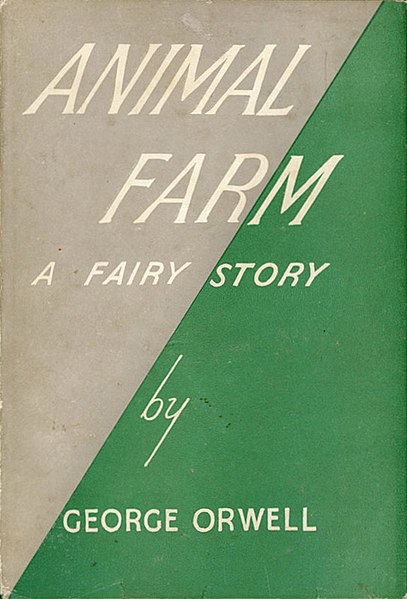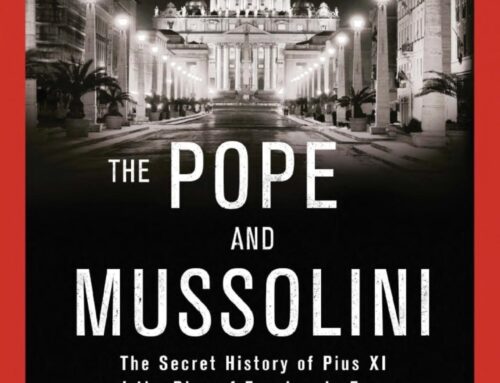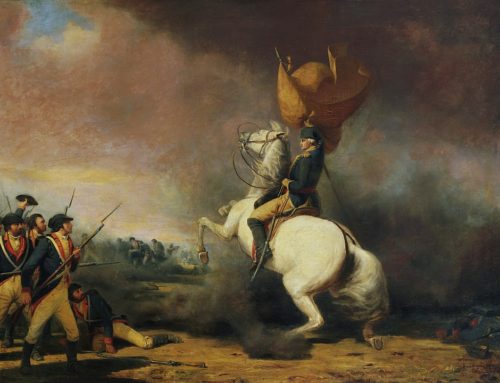Introduction
Animal Farm is an allegorical novel by George Orwell first published in England in August 1945. The book is both fun to read and informative. Orwell related how the ideal of the Russian Revolution are fatally distorted by Stalin.
The book tells the story of a group of farm animals who rebel against their human farmer, hoping to create a society where the animals can be equal, free, and happy. Ultimately, however, the rebellion is betrayed, and the farm ends up in a state as bad as it was before, under the dictatorship of a pig named Napoleon (Stalin). In fact, despite technology (windmill) the animals have less to eat than before the revolution. They undergo worse treatment, and their lives are micro-managed–mandatory attendance to parades and rallies. Animal Farm, a brilliant political satire, is considered one of the hundred greatest books of modern times.
Orwell’s fable reflects the events leading up to the Russian Revolution of 1917. Similar to the reign of Nicholas II, Manor Farm (renamed Animal Farm) was mismanaged by its alcoholic owner, Jones.
The animals revolt initially leads to a farm run for the benefit of all the animals. Two pigs (Napoleon and Snowball) established the farm’s agenda. During the introductory stages, the farm provided benefits to the animals.
However, over time, a dictatorship under Napoleon (Stalin) evolved. His rule was backed by vicious dogs who ultimately wantonly killed opponents of Napoleon. Just like the Show Trials of the Soviet Union in 1937-1938, the pig opponents of Napoleon admit under duress their treasonous activities. Despite their confessions, Napoleon’s pigs viciously kill them. Hens who object to giving up their eggs also are martyred. The death toll of the animals far exceeded deaths under the predecessor owner Jones. Snowball flees the farm to save himself. However, all of the subsequent errors and mistakes of farm management are blamed on Snowball and his secret allies.
At the end of the book, the pigs stand on two legs, dress elegantly, and live luxurious lives in Jones’ home. By contrast the animals live in poverty. Orwell shares his pessimistic vision that although the Russian Revolution was initially an idealistic venture, power corrupts.
Beasts of England
Beasts of England, the ballad of the animals, ultimately are rejected by Napoleon because it was a song of the revolution. Napoleon does not want another revolution. Initially it served to create unity and its banning represented the loss of hope for a better life.
The animals sing “Beasts of England” frequently after the rebellion, especially after meetings. At one point when Clover the horse questions the direction of Animal Farm, she sings “Beasts of England” which causes the other animals to join in.
After “Beasts of England” has been used to express criticism of the direction of Animal Farm, Napoleon tries to supplant the song, arguing that such an anthem is antiquated and no longer needed after the rebellion has been completed. The anthem is first replaced by the short “Animal Farm!” and later by “Comrade Napoleon”, while “Beasts of England” is eventually outlawed.
The phasing out of “Beasts of England” as the anthem of Animal Farm corresponds to the Soviet Union’s 1944 replacement of The Internationale with the National Anthem of the Soviet. However, while “Beasts of England” was banned in Animal Farm, “The Internationale” was not in the Soviet Union at any time and remained the anthem of the Communist Party.
Beasts of England, Beasts of Ireland,
Beasts of every land and clime,
Hearken to my joyful tidings
Of the Golden future time.
Soon or late the day is coming,
Tyrant Man shall be o’erthrown,
And the fruitful fields of England
Shall be trod by beasts alone.
Rings shall vanish from our noses,
And the harness from our back,
Bit and spur shall rust forever,
Cruel whips no more shall crack.
Riches more than mind can picture,
Wheat and barley, oats and hay,
Clover, beans, and mangel-wurzels
Shall be ours upon that day.
Bright will shine the fields of England,
Purer shall its waters be,
Sweeter yet shall blow its breezes
On the day that sets us free.
For that day we all must labour,
Though we die before it break;
Cows and horses, geese and turkeys,
All must toil for freedom’s sake.
Beasts of England, Beasts of Ireland,
Beasts of every land and clime,
Hearken well, and spread my tidings
Of the Golden future time.[2]
Animal Farm had utopian beginnings. Sadly, its original commandments are altered to fit the political wishes of Napoleon
The Original 7 commandments
- Whatever goes upon two legs is an enemy.
- Whatever goes upon four legs, or has wings, is a friend.
- No animal shall wear clothes.
- No animal shall sleep in a bed.
- No animal shall drink alcohol.
- No animal shall kill any other animal.
- All animals are equal
By the end of Animal Farm, the Commandments have all be changed
Four legs good, two legs better (the pigs have learned to stand on two legs and hold whips).
No animal shall sleep in a bed with sheets. (The pigs are living in the mansion and sleeping on beds)
No animal shall drink alcohol to excess (Napoleon and the pigs discover the joys of alcohol)
No animal shall kill any other animal without due cause (Napoleon ruthlessly subdues his perceived critics)
All animals are equal, but some are more equal than others. (The pigs and dogs do not need to work to raise food.)
Conclusion
Historical Setting
To really understand the controversy with Animal Farm, it is important to know the historical setting at the time it was written.
Although not about World War II, George Orwell wrote his novel as the war was coming to an end. During the war, Great Britain (Orwell’s home country) and the Soviet Union worked as allies. Along with the United States, the three countries formed the Grand Alliance. The alliance definitely brought together three different countries and politics. There had been tension between the three leaders and a long history of disagreement, especially politically. However, the three countries recognized that Germany was a threat to Great Britain’s colonies, and Japan was a threat to both the United States and the Soviet Union. If Germany and Japan continued to work together, they could create a very strong alliance.
Because of the Grand Alliance, the Axis Powers were defeated and World War II came to an end. Although rocky, Great Britain had established a relationship with the Soviet Union.
An Allegory
Why is the publishing of Animal Farm, an allegory, such a problem for British publishers?
In an allegory, the characters and the plot represent real people and real situations. The decline of Mr. Jones’ farm and the animal uprising is an allegory of the Russian Revolution of 1917 and the early stages of the Soviet Union. The characters in ‘Animal Farm’ each represent one of the leaders of the Russian Revolution. Mr. Jones, the failing farmer, signifies Czar Nicholas II. Old Major, the wise philosopher, is Vladimir Lenin; Snowball, the pig who wants to act in Old Major’s footsteps, symbolizes Leon Trotsky. Napoleon, the cruel leader, portrays Joseph Stalin.
In 1917, the Russian people were unhappy with Czar Nicholas II and his corrupt government. The economy was destroyed by World War I. As the government continued to crumble, people protested, Czar Nicholas II stepped down, and the Bolshevik Revolution began. Vladimir Lenin emerged as one of the early leaders. Just like Old Major, Lenin organized people and called for an uprising against an unfair ruler. He believed that equality for all could be achieved, even if this required taking action against leaders.
When Lenin became ill, both Trotsky and Stalin emerged as leaders. The two new leaders had very different plans for how to lead the Soviet Union. Starting to sound familiar? Just as Napoleon drove out Snowball to secure his position, Stalin banished Trotsky from the Soviet Union. Stalin changed the initial political plan, removed political leaders, and used his secret police to gather those he felt were enemies. Just like Mr. Jones’ farm, the Soviet Union became just as broken down, if not worse, under Stalin.
Publishing Struggles
After Orwell finished writing ‘Animal Farm’, he struggled to find a publisher that would work with the book. Publishers rejected the book, believing publishing the novel would create tensions between Great Britain and the Soviet Union again. It was simply too controversial to publish at the time.
Within a year, Orwell’s novel was rejected by four publishers. One publisher, T.S. Eliot, wrote to Orwell and told him that although his writing was good, he found the argument ‘not convincing’. Eliot said to him, ‘We have no conviction that this is the right point of view from which to criticize the political situation at the current time’.
The book was finally published in August 1945, after the defeat of Nazi Germany. “Animal Farm” was an instant success in England and the United States. It was a Book-of-the-Month Club selection; it was quickly translated into many languages and distributed, in some countries, by the United States government; and it made Orwell, who had spent most of his life scraping by, famous and rich.




